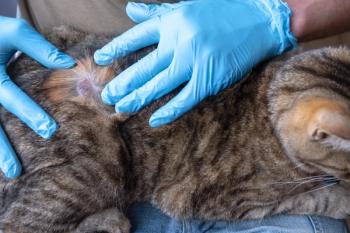
Losing veterinary product sales? Go down swinging, CVC speaker says
The future may look grim for veterinary pharmacies, but Fritz Wood, CPA, CFP, urges veterinarians not to give up yet.
Washington, D.C.— Veterinarians need to stop complaining about online pharmacies and big box stores and start competing, says Fritz Wood, CPA, CFP, a veterinary financial planner and owner of H.W. Wood Consulting in Lake Quivira, Kan. At a practice management session at CVC Washington, D.C., on April 28, he said the future looks grim but veterinarians should fight until the bitter end.
Michaela Begsteiger/Getty Images
"These pharmacies are trying to take the food off your table and keep your kids from going to college," Wood says. "Are you just going to roll over and wet yourself? It's time to take off the gloves and start fighting back."
Wood told attendees they still have loads of opportunities for product sales; however, they shouldn't carry the same products as Walmart and Target because they'll lose. Veterinary practices may not be able to offer better prices, but veterinarians can offer better value. Wood suggested that attendees stock their shelves with veterinary-exclusive and high-end products, including pet food.
"I Googled 'premium dog food' and got 8,580,000 results," Wood says. "More than 90 percent of pet owners want a specific food recommendation for their dog or cat and only 10 percent get one."
Attendee Saye Clement, DVM, of Carling Animal Hospital in Ottawa, Ontario, says pet food sales are just as important as pharmaceutical sales—if not more so. "You're not a pet food salesman—think of it as treatment," Clement says. "Pets have to eat anyway; might as well put them on something that will help them."
Then Wood pointed out another plus: If clients purchase wellness diets from veterinary clinics, pets will most likely live longer, which is ideal for the pet owner, veterinarian and pet—everybody wins. He also brought up the highly debated topic of price-matching, saying that even if you price-match on just one product, clients will assume you're fair across the board. This will build client trust and create a positive perception that will carry over to other veterinary services.
During that discussion attendee and practice manager Tammy Flyte said her practice, Wysox Animal Clinic in Wysox, Pa., started price-matching in January 2012, and her revenue doubled compared with first quarter profits in 2011. The only prices her clinic matches are PetMed Express prices on Revolution, Frontline and Heartgard Plus. Staff members keep track of these prices to regulate the process, which saves clients the hassle of remembering to bring in the ad.
Flyte says product sales are soaring—and her patients are benefiting too. "
If veterinarians decide to slash select prices they must vigorously promote them in order to for sales to improve, Wood says. "Add a footer on all invoices, tape signs in waiting and exam rooms, and put up a big banner if you're located on a well-traveled road," he says. "Price-matching won't do you any good if you don't promote it."
Wood also told attendees to clearly display their products' prices, otherwise they send the wrong message. "Don't act like you're embarrassed about your prices," Wood says. "Transparency is good."
Matching prices isn't the only way to stay competitive. Other ideas from attendees included encouraging clients to "buy local" and reminding them to support the businesses that pay for schools and parks in the community.
Table: Eat up these numbers
Another strategy is to warn clients of the risk of buying products elsewhere. Wood suggests citing recommendations from the U.S. Food and Drug Administration (FDA), American Animal Hospital Association (AAHA), Companion Animal Parasite Council (CAPC) and other authorities. What's more, he told attendees to be blunt and say, 'We hate to see our clients buy pharmaceuticals from non-experts.' Veterinarians should emphasize that the clinic's products aren't expired and are stored at appropriate temperatures, Wood says.
Wood also had a warning for veterinarians. "You all must be prepared to answer the $64,000 question from clients: 'What do I get from your practice that I can't get from
Explain that when pet owners purchase products from the clinic they are buying the veterinarian's professional opinion, which isn't sold in big box stores, Wood says. "Tell them that the client-patient-doctor relationship at the clinic comes with a warranty—and not just a money-back guarantee," Wood says. "If the veterinary product fails, you'll cover the cost of treatment."
After veterinarians tell clients, they need to show them. "Veterinarians give clients too much credit," Wood says. "Apply a free dose on the pet right there while the client can watch." This will literally demonstrate the value of your services, Wood says.
Newsletter
From exam room tips to practice management insights, get trusted veterinary news delivered straight to your inbox—subscribe to dvm360.




